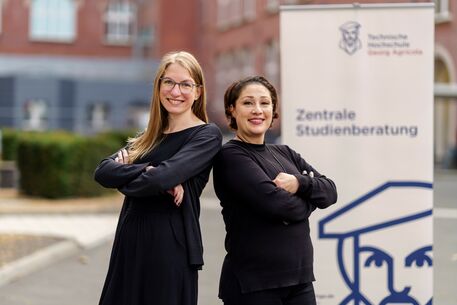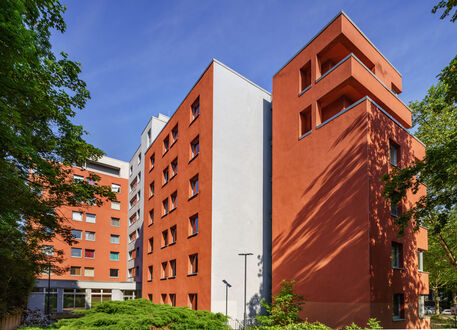Discover the future of energy and automationStudy Electrical Engineering
Have you ever wondered how we ensure we have enough energy for our everyday lives in a world that is increasingly focussing on e-mobility?
Have you ever immersed yourself in the fascinating world of robotics? Do you know how much automation there is in buildings or what the Internet of Things is all about?
You can explore and answer these and many other fascinating questions in the practical electrical engineering degree programme. With specialisations in energy technology, automation technology and general electrical engineering, we prepare you for a versatile and future-oriented career.
Full-time or part-time - the choice is yours
You can study electrical engineering full-time or part-time. When studying full-time, you have the opportunity to choose your individual specialisation from the third semester onwards. In addition to general electrical engineering, you can also focus on automation technology or energy technology. In the part-time programme, you focus on general electrical engineering. We do not charge tuition fees. There is only a semester fee, which includes the NRW-Ticket.
Study Specialisations
This specialisation is an exciting combination of energy technology and automation technology. It is the basis for the changes in factories, cities and the means of transport of the future. You will immerse yourself in the world of electrical power generation, where we explore the sources and technologies that power our electricity supply. From traditional methods to renewable energy, you will explore the many ways in which electricity is generated and how it powers our society. But that's not all, as you'll also explore technologies around machine learning, artificial intelligence and connected devices.
Here you will learn how industrial processes can be automated. Sensors play a role in automation. For example, they record building data and forward it automatically. This makes it possible to control a building's power supply. Modern microelectronics play an important role here and help to drive technology forward.
You are concerned with how electrical energy is produced, transported and distributed. The central question here is how to generate and use electrical energy in a safe, cost-effective and environmentally friendly way. The energy transition will increasingly emphasise renewable energy sources such as wind power, photovoltaics and hydropower. You will learn how to generate energy from these sources, how to deal with fluctuations and how to manage consumption safely. It is just as important to expand electricity grids or further develop energy systems.
More Information
- Full-Time Study Programmepdf, 138 KB
- Half-Time Study Programmepdf, 78 KB
- Work-Study Programmpdf, 145 KB
Work&Study Programme
Gaining work experience and studying at the same time is no problem for us. With our study programme you have the opportunity to earn money while studying and actively work on your career at the same time. Our work-study programme offers an optimal combination of engineering studies and practical work experience.
Degree:
Bachelor of Engineering (B.Eng.)
Duration:
Full-time: 6 semesters
Part-time: 9 semesters (Major General Electrical Engineering)
Programme start:
Generally, the programme starts in the winter semester; however, students can also enrol in the summer semester.
Entry requirements:
University Entrance Certificate (non-standard entry is also considered), the Bachelor programme is taught entirely in German. Proof of C1 must be provided.
Crisis-proof job with good payYour Career Prospects
As a Bachelor of Electrical Engineering, you have a wide range of career options. You can see a few examples here:

As a development engineer, you develop new products or modify them. You tinker with technologies and find ways to make things better, faster and more efficient. It's a mixture of technology, creativity and problem solving that makes this job so exciting.

In this job, you will shape the future of energy supply! You will not only lead a team, but also coordinate projects that make the electricity grid smarter. As part of the team, you will look for customised solutions for digital local grid and customer transformer stations to make the energy supply even more efficient.

As a Hardware Developer, you will be the creative mind behind the latest technological devices that can change the world! You will be involved in the process of developing IT hardware products from start to finish. From basic ideas to system architecture - your expertise is in demand.
Add a Master's degree straight away
Continue your studies at the THGA: With a bachelor's degree in electrical engineering in your pocket, you can continue your career. We offer you the advanced Master's degree programme in Electrical Engineering and Information Technology.
Contact
Prof. Dr.-Ing. Dirk Brakensiek
- Dirk.Brakensiek[at]thga.de
- Telephone
- +49 234 968-3339
- Office
- G7 R110

Christopher Dillmann - M.Eng.Programme study advice Electrical Engineering
- Christopher.Dillmann[at]thga.de
- Telephone
- +49 234 968-3270
- Office
- G7 R112













